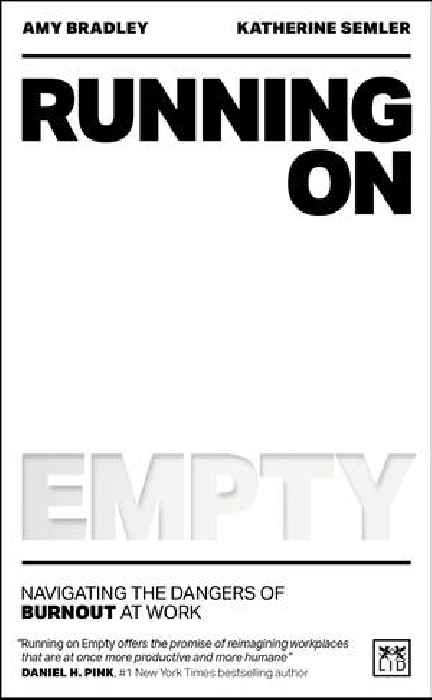Tuesday 18 October, 2022Running on Empty, researched and written by leadership experts Dr Amy Bradley and Dr Katherine Semler, aims to support individuals and organizations to navigate the ever-increasing dangers of burnout at work. The book challenges current notions of recovery from burnout and introduces a way ahead for a more sustainable future.
In recent years, we’ve been faced with a perfect storm initially brought about by the COVID-19 pandemic, such as more demanding work responsibilities combined with increasingly challenging life circumstances for many people. A study on remote working, for example, found that working hours in 2020 were 30% higher than before the pandemic, with over half of those additional hours being done outside the normal working day. In 2021, the American Psychological Association reported that 79% of people had experienced work-related stress that month alone. Job resignations in the United States in 2021 were up by 15% on 2019, which was a record year in itself. It seems that the pandemic has been a catalyst for a collective awakening when it comes to reassessing our relationship with work and highlights the need for companies to take burnout more seriously.
Running On Empty explores the causes, symptoms and effects of burnout at work today – and how to overcome them. It shares the real-life stories of people at all levels and positions struggling with or on the verge of a breakdown. Offering real and deep practices, this book outlines the way forward for people and companies to tackle burnout.
Daniel H. Pink, #1 New York Times bestselling author of The Power of Regret, Drive and When, says about Running on Empty: “Burnout might be the defining workplace challenge of our time. But this timely and insightful book refuses short cuts and simple solutions and instead examines the root cause of the problem. By challenging, the notion that our work always equals our worth, Running on Empty offers the promise of reimagining workplaces that are at once more productive and more humane.”
Katherine Semler and Amy Bradley comment on why they decided to write the book: “As the Covid-19 crisis deepened, an increasing number of the people around us - clients, coaches, friends, colleagues - were hitting the wall and we were showing signs of the same. There was a general sense of depletion and an inability to resource ourselves. The research that led to this book was as much an act of self-care and communal care as it was a hunch that organizations and people have been headed in an unhealthy direction for some time, with the pandemic simply accentuating this decline. Having worked alongside individuals either in, or perilously close to burnout over a two-year period, we uncovered a host of practices that, with sustained attention, can help keep us remain whole. Furthermore, by bringing people together into a community inquiry, we were able to radically reimagine the kinds of organizations that would truly tackle burnout at its roots.
ENDS
Notes to editors:For all media enquiries, please contact Teya Ucherdzhieva; M: +44 (0) 7928 666131; E: teya.ucherdzhieva@lidbusinessmedia.comRunning On Empty will be published on 27th October by LID PublishingDr Amy Bradley is a Professor of Leadership and Management specializing in compassionate leadership, burnout and engagement at work, and is the author of The Human Moment. Amy works as adjunct faculty at several leading business schools including Hult Ashridge, Henley and the Irish Management Institute (IMI). She can be found on LinkedInDr Katherine Semler is a partner at Korn Ferry Hay Group in Spain and specializes in supporting leaders and organizations to define and live their purpose. She is adjunct faculty at Hult Ashridge and was previously in corporate learning and programme design at Telefonica University and IESE Business School. She can be found on LinkedInFor more information about LID Publishing please visit www.lidpublishing.comDistributed by https://pressat.co.uk/
New Book Challenges the Notions of Recovery from Burnout
Pressat
0 shares
1 views


